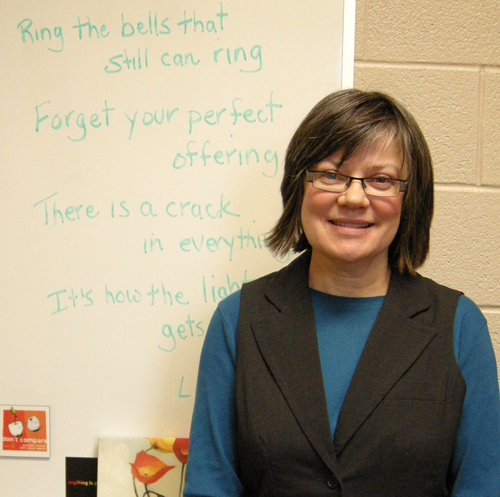
If you didn’t enjoy doing something, felt apprehensive about even getting started and produced mediocre results, wouldn’t you think it might be time to try a different approach?
Prof. Joan Flaherty, Hospitality and Tourism Management, says most people find writing intimidating and less-than-enjoyable. That’s why she thinks it’s time for something new: a counter-intuitive approach that turns what you’ve been taught about writing upside down. She’ll be teaching a half-day session on this at the Writer’s Workshop, which will be held Feb. 24 and 25 at the University of Guelph Library. Flaherty’s workshop, The Counter-Intuitive Writer: How to Improve Your Writing by Doing the Opposite of What You’ve Probably Been Taught, runs from 9 a.m. to noon Feb. 24.
This two-day event is free to U of G students, staff and faculty but requires pre-registration. The greater Guelph community is also welcome to attend for a fee: $30 per session, $50 for a day pass. Visit the library website for details and to register.
Flaherty teaches communications to undergraduate hospitality and tourism management students and management communications to MBA students. Her classes, like her workshop, teach writing skills in an accessible way. “It’s very practical, work-related writing,” she explains. “My students want to know how they can begin applying what they learn right away.”
That doesn’t mean her classes are boring or lack depth. Flaherty says: “I find that everything is practical, even if it seems philosophical. I’ll quote Sir Francis Bacon and E.M. Forster to my students because their thoughts about writing have direct application to the work we’re doing in class.”
Why “do the opposite of what you’ve probably been taught?”
Flaherty says: “Really good communicators stand out from the crowd in a positive way. You don’t want your written work to be just like everyone else’s. If yours is different, it’s more likely to be read.”
For example, writers are often told “write what you know,” but Flaherty suggests instead “write to find out what you know.” She throws in a quotation from Bacon: “If a man will begin with certainties, he shall end in doubts; but if he will be content to begin with doubts, he shall end in certainties.” In other words, Flaherty explains, writers shouldn’t worry about feeling that they don’t know how to start what they want to write or that they haven’t figured out the ending. Those uncertainties can actually be strengths.
“It’s good if you have some doubt in the beginning,” she says. “It helps you keep your mind open. While the structure of writing should be predictable, it’s good to have the content be unpredictable because those surprises get the reader’s attention.”
Another example: many students or would-be writers have the idea that grammar and stylistic flourishes are the key components of writing, but Flaherty calls those aspects “just the icing on the cake. It’s the ideas and how the ideas fit together that are really what the writing is about. The notion of perfection in writing really gets in our way.”
She also believes that the concept of writing as a solitary activity is another of those “things you were probably taught” that should be jettisoned. “Yes, you have to do some thinking and writing on your own,” Flaherty acknowledges, “but the more thoughts and ideas of others you take in, the more your own ideas are enhanced. And when you show your work to other people and get feedback, you’ll discover new perspectives that will help you with the revision process.”
Many people also believe that good writers are fast writers, but again Flaherty says that isn’t necessarily so. “We think that’s how it will be, because with other activities we get faster as we get better. If I were a better knitter, I would be able to whip up a scarf in no time. But writing isn’t like that. Very good writers are often quite slow, although you can’t tell that by reading what they’ve written.”
Despite her own track record of published work, and fifteen years of teaching about writing, Flaherty doesn’t claim to have mastered all these counter-intuitive skills. In fact, she says that much of what she teaches or presents is for her own benefit. She adds: “Writing is not a finite skill. There’s always another level you can be working towards.”